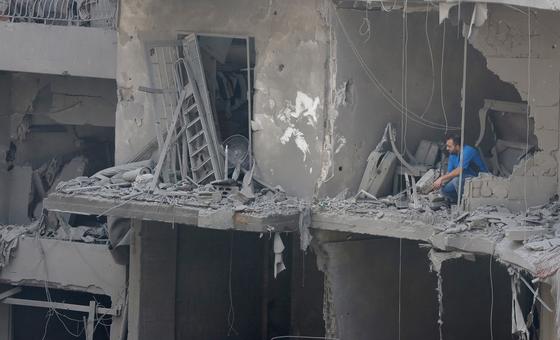Hours after Iran fired a reported 200 missiles at Israel in response to Israeli military incursions in southern Lebanon raising fears of a wider Middle East escalation, UN human rights chief Volker Türk insisted on Wednesday that “peace must prevail” in the Middle East, while UN Member States meeting in Geneva reiterated calls for a ceasefire in Gaza and beyond.
The development came as UN Secretary-General António Guterres condemned “escalation after escalation” in the Middle East on Tuesday and as UN High Commissioner for Human Rights chief Volker Türk called for an immediate de-escalation, ahead of a meeting of the Security Council in New York on the emergency on Wednesday.
“I implore all States, including Members of the Security Council, to act resolutely to prevent a wider conflict in the Middle East with potentially devastating consequences for civilians,” he said. “It is vital that they use their voices and influence to bring the warring parties to the negotiating table to end this.”
Human Rights Council impetus
In Geneva, meanwhile, a scheduled meeting of the Human Rights Council on the Occupied Palestinian Territory got underway. Twenty-four of the forum’s 47 members took the floor, along with 36 countries with Observer status, as delegations stressed the need for an end to the war in Gaza and the release of all Israeli hostages.
They also expressed deep concerns about the dangerous regional escalation between Hezbollah and Israel, amid reports of clashes between Hezbollah and the Israeli military within the UN-patrolled line of separation and Iran’s targeting of Israel with rockets.
Almost a year since Hamas-led attacks in Israel left more than 1,250 dead and more than 250 taken captive, countries including Chile condemned the 7 October outrage and noted that “not only has the return of all hostages held by Hamas not been achieved, but there has also been a total siege imposed by Israel on the Palestinian population in Gaza”.
Iranian stance
Israel – which was not present in the debate – faced renewed allegations from countries including South Africa of perpetrating genocide against Palestinians with impunity, accusations echoed by Iran’s Foreign Minister Abbas Alaki. “Every moment of inaction results in the continued slaughter of innocent Palestinian and Lebanese civilians,” he said via video message, in a call for accountability and the establishment of a special international human rights mechanism “to investigate and document” alleged “criminal acts” by Israel “in Gaza, Rafah, Lebanon and throughout the whole [of] Asia”.
States including the United Arab Emirates reiterated the need for unfettered humanitarian access into Gaza, while Senegal noted that the war in Gaza had spared “neither women nor children, nor vital infrastructure” and that it remained “an open wound on our collective conscience”.
The deteriorating situation in the West Bank where Israeli military operations targeting Hamas operatives and Israeli settler attacks have also had negative repercussions on “the most basic rights” of Palestinians, Senegal maintained, during the debate on the human rights situation in the Occupied Palestinian Territory which is available on webtv.un.org

